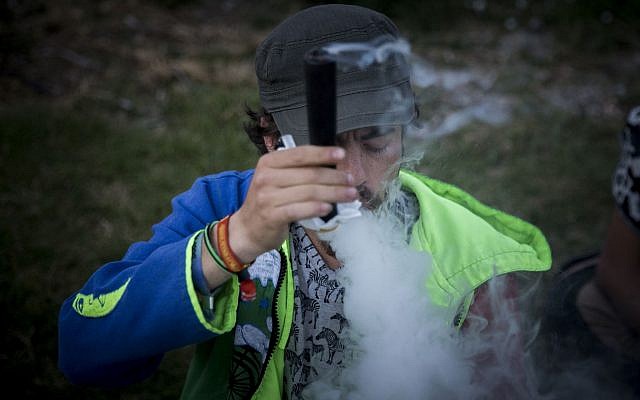Ahead of elections, Netanyahu reportedly set to support Likud MK Haskel’s bill softening laws on marijuana; Likud also appoints new adviser to target Russian-speaking voters

Israelis
gather at the Rose Garden in front of the Knesset to mark the
international '4:20' marijuana smoking day, in a demonstration to push
legalizing the drug, in Jerusalem, on April 20, 2017. (Yonatan
Sindel/Flash90)
In a sign that election season has well and truly returned,
Prime Minister Benjamin Netanyahu may push through legislation to
legalize pot smoking in public, as well as allow Israelis to grow small
amounts of marijuana in their homes, Channel 13 news reported Wednesday.
The new proposal is an initiative of Likud lawmaker Sharren Haskel, one of the the party’s youngest MKs and a longtime advocate of pot legalization.
The bill would allow pot smoking in any public location where cigarette smoking is allowed, and would permit Israelis to grow up to 15 seeds of cannabis in a single planter per household.
“This was a promise [by Likud] in the last elections, and it’s something we have to deliver for our public,” Haskel told Channel 13.
 She said Netanyahu was “open to the idea, and is weighing it
favorably. I promise to fight for this over the next two weeks to ensure
we have genuine decriminalization.”
She said Netanyahu was “open to the idea, and is weighing it
favorably. I promise to fight for this over the next two weeks to ensure
we have genuine decriminalization.”
Netanyahu promised to pursue full legalization during the last campaign, just days before the April 9 ballot.
If Likud wants to pass the bill, it will have to push it through committees and plenum votes over the next two weeks, when the Knesset is in recess. Once the official 90-day campaign period begins, the Knesset is not allowed to legislate.
Pot legalization has long enjoyed support in left-wing Meretz and became part of the Labor party’s platform in the last election in April, but has faced some opposition and skepticism on the right, most notably in recent years from Public Security Minister Gilad Erdan, who oversees the Israel Police.
If passed, the law is likely a bid to eat away at support for the Zehut party, which performed well in campaign polling earlier this year, but failed to make it into the Knesset in the April 9 vote.
Zehut combined far-right positions on security and territorial claims, including support for retaking Gaza and annexing the West Bank, with libertarian domestic positions, such as instituting a school voucher system and legalizing marijuana. The combination drew an eclectic cross-section of protest voters, from far-right religious seminary students in the West Bank to far-left pot legalization campaigners in Tel Aviv.
 Even though it failed to reach the 3.25% threshold of valid ballots
to enter the Knesset, Zehut received nearly 120,000 votes, almost enough
for three Knesset seats. Its founder Moshe Feiglin has vowed to run again in the September race.
Even though it failed to reach the 3.25% threshold of valid ballots
to enter the Knesset, Zehut received nearly 120,000 votes, almost enough
for three Knesset seats. Its founder Moshe Feiglin has vowed to run again in the September race.
In March, cannabis possession was partially decriminalized in what Erdan called at the time a “cautious” experiment. Individuals caught carrying small amounts of pot on their person in public would initially face fines of NIS 1,000 ($280) and NIS 2,000 ($560), and would only face criminal indictments after being caught several times within a five-year period.
Pot activists blasted the new policy as a de facto increase in restrictions on pot consumption.
 They argued that police already had an unspoken policy of mostly
ignoring first-time personal-use cannabis consumption in public spaces,
in part because the alternative has been to open large numbers of
criminal probes into otherwise law-abiding citizens. The switch to fines
effectively streamlined the enforcement process and lowered the bar for
punishment, and so would likely increase enforcement on the ground.
They argued that police already had an unspoken policy of mostly
ignoring first-time personal-use cannabis consumption in public spaces,
in part because the alternative has been to open large numbers of
criminal probes into otherwise law-abiding citizens. The switch to fines
effectively streamlined the enforcement process and lowered the bar for
punishment, and so would likely increase enforcement on the ground.
The new proposal is an initiative of Likud lawmaker Sharren Haskel, one of the the party’s youngest MKs and a longtime advocate of pot legalization.
The bill would allow pot smoking in any public location where cigarette smoking is allowed, and would permit Israelis to grow up to 15 seeds of cannabis in a single planter per household.
“This was a promise [by Likud] in the last elections, and it’s something we have to deliver for our public,” Haskel told Channel 13.

Likud MK Sharren Haskel arrives for a hearing at the Likud party’s internal court in Tel Aviv on January 8, 2018. (Flash90)
Netanyahu promised to pursue full legalization during the last campaign, just days before the April 9 ballot.
If Likud wants to pass the bill, it will have to push it through committees and plenum votes over the next two weeks, when the Knesset is in recess. Once the official 90-day campaign period begins, the Knesset is not allowed to legislate.
Pot legalization has long enjoyed support in left-wing Meretz and became part of the Labor party’s platform in the last election in April, but has faced some opposition and skepticism on the right, most notably in recent years from Public Security Minister Gilad Erdan, who oversees the Israel Police.
If passed, the law is likely a bid to eat away at support for the Zehut party, which performed well in campaign polling earlier this year, but failed to make it into the Knesset in the April 9 vote.
Zehut combined far-right positions on security and territorial claims, including support for retaking Gaza and annexing the West Bank, with libertarian domestic positions, such as instituting a school voucher system and legalizing marijuana. The combination drew an eclectic cross-section of protest voters, from far-right religious seminary students in the West Bank to far-left pot legalization campaigners in Tel Aviv.

Moshe Feiglin, head of the Zehut party,
during an election campaign tour in the Mahane Yehuda market in
Jerusalem on April 4, 2019. (Yonatan Sindel/Flash90)
In March, cannabis possession was partially decriminalized in what Erdan called at the time a “cautious” experiment. Individuals caught carrying small amounts of pot on their person in public would initially face fines of NIS 1,000 ($280) and NIS 2,000 ($560), and would only face criminal indictments after being caught several times within a five-year period.
Pot activists blasted the new policy as a de facto increase in restrictions on pot consumption.

Young Israelis gathered at the Rose
Garden in front of the Knesset, to smoke weed, on the international
‘4:20’ marijuana smoking day, in a pro-legalization demonstration, in
Jerusalem on April 20, 2016. (Hadas Parush/Flash90)
Erdan
has disputed the argument, saying in April that the rate at which fines
were handed out in the first weeks under the new policy was
significantly lower than the rate at which criminal case files were
opened for cannabis possession before the policy went into effect.
Among Western countries, Israel already has one of the highest per capita rates of legal marijuana use, with over 21,000 people medically licensed to use the drug.
Last month, the Health Ministry announced it was preparing new guidelines that would make obtaining medical marijuana even easier. Under the new policy, marijuana will be taken off the ministry’s dangerous substances list, allowing pharmacies to stock it in their inventories and doctors to prescribe the drug without requiring special permission from the Health Ministry for each patient. No date was given for the implementation of the new policy.
The new attention to cannabis legalization comes amid growing calls over the past three years to legalize and regulate the substance, including from senior officials in the Justice Ministry and other law enforcement bodies.
Likud also announced Wednesday the appointment of a new “special adviser” for Israel’s Russian-speaking community.
The adviser, attorney Ariel Bulshtein, will help the Likud campaign target a demographic that will be vital for Likud campaign — right-leaning immigrants from the former Soviet Union.
 The move is meant to help the party’s efforts to siphon votes away
from Yisrael Beytenu, the Russian-speaking party led by Avigdor
Liberman, whose hard-nosed demands stymied Netanyahu’s efforts to build a
coalition by the May 29 deadline.
The move is meant to help the party’s efforts to siphon votes away
from Yisrael Beytenu, the Russian-speaking party led by Avigdor
Liberman, whose hard-nosed demands stymied Netanyahu’s efforts to build a
coalition by the May 29 deadline.
Rather than possibly hand the premiership to someone else, Netanyahu called unprecedented new elections after that failure, accusing Liberman of being “part of the left” and vowing to deliver an even better showing for Likud in the September 17 race.
Bulshtein’s appointment was mocked by Liberman, who tweeted, “Yesterday the prime minister appointed an adviser for livestock. Today, after polls showed Yisrael Beytenu winning 10 seats, he appointed an adviser for immigrants from the former Soviet Union. That only shows the hysterical pressure he feels. Tomorrow we’ll probably hear about the appointment of yet another adviser — for polar bears.”
Likud responded by accusing Liberman, himself an immigrant from Moldova, of comparing Israel’s Russian-speaking immigrants to animals, and insisted that Bulshtein “can offer a great deal to advance the standing of FSU immigrants and to solve the challenges they face. It’s a shame Yvet [Liberman] only cares about Yvet.”
Among Western countries, Israel already has one of the highest per capita rates of legal marijuana use, with over 21,000 people medically licensed to use the drug.
Last month, the Health Ministry announced it was preparing new guidelines that would make obtaining medical marijuana even easier. Under the new policy, marijuana will be taken off the ministry’s dangerous substances list, allowing pharmacies to stock it in their inventories and doctors to prescribe the drug without requiring special permission from the Health Ministry for each patient. No date was given for the implementation of the new policy.
The new attention to cannabis legalization comes amid growing calls over the past three years to legalize and regulate the substance, including from senior officials in the Justice Ministry and other law enforcement bodies.
Likud also announced Wednesday the appointment of a new “special adviser” for Israel’s Russian-speaking community.
The adviser, attorney Ariel Bulshtein, will help the Likud campaign target a demographic that will be vital for Likud campaign — right-leaning immigrants from the former Soviet Union.

Ariel Bulshtein (Courtesy of EAJC)
Rather than possibly hand the premiership to someone else, Netanyahu called unprecedented new elections after that failure, accusing Liberman of being “part of the left” and vowing to deliver an even better showing for Likud in the September 17 race.
Bulshtein’s appointment was mocked by Liberman, who tweeted, “Yesterday the prime minister appointed an adviser for livestock. Today, after polls showed Yisrael Beytenu winning 10 seats, he appointed an adviser for immigrants from the former Soviet Union. That only shows the hysterical pressure he feels. Tomorrow we’ll probably hear about the appointment of yet another adviser — for polar bears.”
Likud responded by accusing Liberman, himself an immigrant from Moldova, of comparing Israel’s Russian-speaking immigrants to animals, and insisted that Bulshtein “can offer a great deal to advance the standing of FSU immigrants and to solve the challenges they face. It’s a shame Yvet [Liberman] only cares about Yvet.”

No comments:
Post a Comment